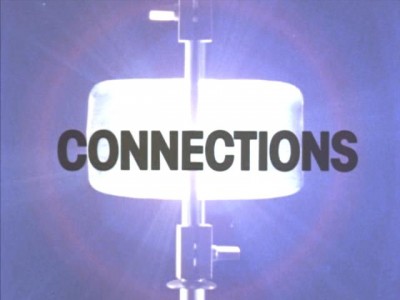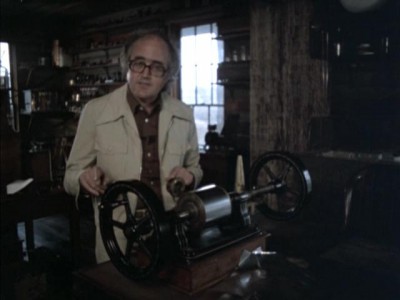| Reviews & Columns |
|
Reviews DVD TV on DVD Blu-ray 4K UHD International DVDs In Theaters Reviews by Studio Video Games Features Collector Series DVDs Easter Egg Database Interviews DVD Talk Radio Feature Articles Columns Anime Talk DVD Savant Horror DVDs The M.O.D. Squad Art House HD Talk Silent DVD
|
DVD Talk Forum |
|
|
| Resources |
|
DVD Price Search Customer Service #'s RCE Info Links |
|
Columns
|
|
|
Connections 1
Ambrose Video // Unrated // March 1, 2007
List Price: $149.99 [Buy now and save at Amazon]
The Series:
When I was in college (a long while ago) I happened upon a documentary series on PBS that has stayed with my through the intervening decades. It was on the history of science, and since I was studying chemistry that was right up my alley. The thing impressed me about the show was that the host (and writer), James Burke, took a wide view of man's progress. He didn't limit himself to one discipline, nor did he merely catalog what humans have discovered. He presented an early innocuous invention or event and then traced the effects of that advancement through history, connecting one discovery to another until, centuries later, we find that the use of the stirrup at the Battle of Hastings in 1066 set in motion a chain of events that eventually produced the telephone. The threads that the show traces are always unexpected, unusaul, and very engaging. This 10 part series, Connections, is available on DVD from Ambrose Video, a company that primarily sells to the academic market. Though the price is a bit steep, the content is well worth the cost.

James Burke's series is rather unique in the fact that it takes a very broad view of science and history. The show has an interdisciplinary approach that works surprisingly well. He doesn't just talk about advances in physics or astronomy, he discusses an advance in metallurgy then jumps to chemistry then engineering then the politics of the day and how that created forces that led to a discovery in biology.
The time scale is rather large too. Many documentaries confine themselves to one era, the Dark Ages or WWII. Burke doesn't limit his examination to one time frame, and determining just how much time has passed can get a bit confusing in some episodes, but runs the gamut from prehistory to the present day. (Well, up to 1978 when the show was made.)
To give an idea of the way he strings together necessity, economic forces, and ingenuity to create an episode, take just one small part from the episode The Long Chain: An Englishman, working with coal and tar, discovers the first artificial dye which the Britons pretty much ignore. The Germans take note however and start to explore the chemistry of color. The Germans also have a radical idea that most of the rest of
Meanwhile, an American named McCormick invents the combine harvester and that makes wheat production skyrocket. The price falls. In

So they start growing their own wheat, but there's a problem: they need fertilizer. That has to be imported from
In 1914 war broke out. The first thing the English fleet did was to set up a blockade so the
Of course that's just a small section of the 50-minute show. It actually starts with a group of Dutchman building a new cargo ship in the 16th Century and ends with Dupont creating Nylon and the revolution of plastics. (Nylon was originally going to be called "Dparooit" for "Dupont Pulls A Rabbit Out Of Its Hat" but luckily cooler minds prevailed.)
The wonder of each program is seeing how interconnected events lead to unexpected results. Burke is an excellent host, adding a bit of levity to each show but also keeping the viewers engaged with hits about where the trail with lead next. While some of the connections are a bit tenuous, the show does spark the imagination and presents an intriguing alternative to traditional discipline-centric views of human advancement.
The DVD:
Audio:
The two channel mono soundtrack is adequate. The dialog is always clear and clean though the fidelity is limited to the technology of the time. Nothing special but not bad either.
Video:
The full frame image is fine, but not outstanding. The prints used for the transfer are a bit old, and there is some dirt and minor damage visible. The colors are only fair, a bit more muted than I would have liked but the level of detail is fine. About an average presentation from something this old.
Extras:
Unfortunately there are no extras.
Final Thoughts:
Connections is one of the most interesting documentary series I've ever had the pleasure to view. It's engaging, intelligent, entertaining (my 13 and 16 year old sons loved it) and most of all thought provoking. While the lack of extras is disappointing and the A/V quality is only average, this is an excellent series. It should be on the top of anyone list who wants to understand not only the past, but the current world as well. Highly Recommended.
|
| Popular Reviews |
| Sponsored Links |
|
|
| Sponsored Links |
|
|
| Release List | Reviews | Shop | Newsletter | Forum | DVD Giveaways | Blu-Ray | Advertise |
|
Copyright 2024 DVDTalk.com All Rights Reserved. Legal Info, Privacy Policy, Terms of Use,
Manage Preferences,
Your Privacy Choices | |||||||















